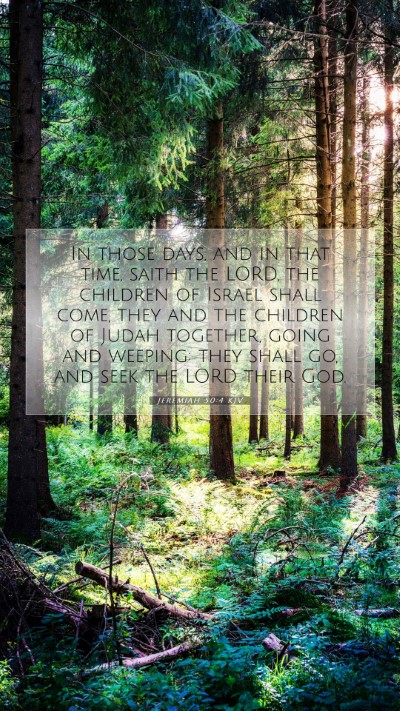Understanding Jeremiah 50:4
Bible Verse: Jeremiah 50:4
This verse states: “In those days, and at that time, the children of Israel shall come, they and the children of Judah together, going and weeping: they shall go, and seek the Lord their God.”
Overview of the Verse
The verse signifies a moment of reconciliation and divine restoration for the children of Israel, emphasizing their united return to God after a period of exile and suffering. It reflects themes of repentance, hope, and the assurance of God’s presence amid tribulations.
Detailed Commentary Insights
-
Matthew Henry:
Henry emphasizes the collective return of Israel and Judah, underscoring the importance of communal faith and togetherness. He notes that their weeping represents genuine repentance and sorrow for their past transgressions, leading them to seek a renewed relationship with the Lord.
-
Albert Barnes:
Barnes elaborates on the context of this passage, highlighting it as a prophecy of restoration and hope. He points out that this return follows a period of judgment from God, and emphasizes that the weeping signifies the acknowledgment of guilt and the deep desire to find God once more.
-
Adam Clarke:
Clarke notes the historical backdrop of Israel’s exile, explaining that this verse symbolizes the end of their captivity and their longing for spiritual reconciliation. He affirms that the action of seeking God implies an active pursuit of faith and restoration rather than passive waiting.
Meaning of Key Phrases
-
"In those days, and at that time":
This indicates a specific prophetic period, reinforcing the future hope that God has for His people where restoration and unity will be realized.
-
"Children of Israel shall come":
Represents the gathering of God's people, signifying unity and the breaking of barriers that once divided them.
-
"Going and weeping":
A vivid illustration of emotional and spiritual turmoil, reflecting genuine remorse and the weight of their past sins.
-
"Seek the Lord their God":
This illustrates a proactive pursuit of God, emphasizing the necessity of a personal relationship with the Divine amidst repentance.
Historical Context
The historical backdrop of Jeremiah 50 occurs during the Babylonian Exile, a time of great despair for the Israelites. Their captivity represented both a consequence of disobedience to God and a context for divine promise concerning future restoration. This passage speaks to their future redemption and reinstatement as God’s chosen people.
Application and Relevance
This verse is particularly significant for modern readers, serving as a reminder of the importance of turning to God in times of trouble. It illustrates the power of collective repentance and the joy found in seeking a relationship with God. Whether in personal devotion or within Bible study groups, this passage encourages believers to explore their paths back to God, emphasizing that He longs for their return.
Bible Study Insights
For those engaging in online Bible study or utilizing Bible study tools, Jeremiah 50:4 provides a rich ground for exploration on themes of repentance, unity, and the faithfulness of God to restore. It challenges individuals to reflect on their personal journeys of faith and the importance of communal worship and accountability.
Additional Cross References
- Isaiah 40:1-2 - A call for comfort and restoration.
- Ezekiel 34:11-12 - The shepherd seeking out His sheep.
- Hosea 6:1 - An invitation to return to the Lord.
- Psalm 126:5-6 - Those who sow in tears shall reap in joy.
Conclusion
Jeremiah 50:4 encapsulates profound truths about the nature of God’s reconciliation with His people. The combined insights from notable commentaries illuminate the significance of this passage, providing a comprehensive Bible verse commentary that encourages deeper Bible study insights and spiritual understanding. As believers seek to apply these lessons to their lives, they are reminded of the never-ending grace available through repentance and the pursuit of God.


